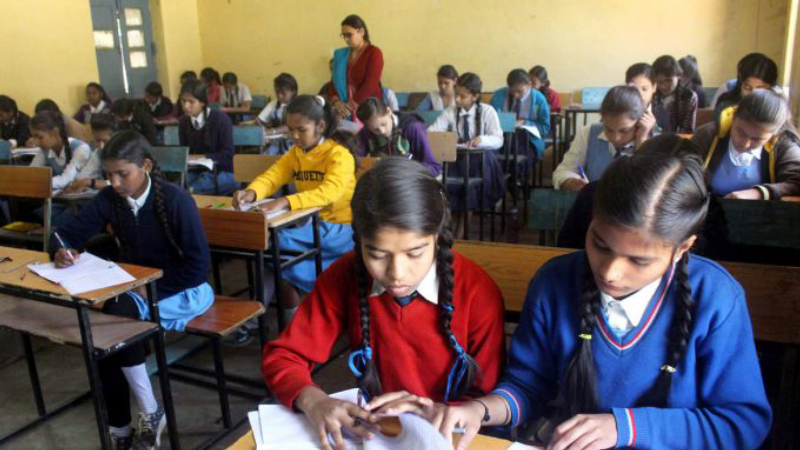Trending Now
Thursday, Nov, 2024
Home / Climate Change Not Sufficiently Integrated Into Countries' Education Framework: UNESCO Report
Climate Change Not Sufficiently Integrated Into Countries' Education Framework: UNESCO Report
According to the GEM (Global Education Monitoring) reported by UNESCO, only 50% of the countries around the globe emphasize the subjects...
 by Sukanya Prabhakar /
by Sukanya Prabhakar /  15 Nov 2021 16:42 PM IST /
15 Nov 2021 16:42 PM IST /  0 Comment(s) / 317
0 Comment(s) / 317

According to the GEM (Global Education Monitoring) reported by UNESCO, only 50% of the countries around the globe emphasize the subjects about their national-level laws, their policies, or teaching plans. Studies related to climatic changes are yet not sufficiently integrated into the education system.
PEER (Profiles Enhancing Education Reviews) is published by the GEM team in the backdrop of the United Nations Change Conference underway in Glasgow. It is aimed at describing policies and laws of the countries on key themes in the education system so as to improve the evidence-based on implementing national educational strategies.
UNESCO Report stated that the critical tool to help the population make aware about climatic changes is through Education. Through education, individuals can be encouraged to change their behaviour and attitude towards nature, that is to support a more sustainable lifestyle and also develop new knowledge and skills about it. With the help of Climate Change Education, the flexibility of vulnerable groups and communities with mitigation and adaptation strategies can be enhanced especially in low-income countries.
Statistics From the UNESCO Report
As per the report, only 75% of the countries in the whole world cover climate change subjects in their national curriculum while there are 40% of the countries which have educational laws that cover climatic change. Also, there are 45% of the countries that include climate change as a subject in their education sector plans and strategies.
In 90% of countries, references related to climatic change are mainly found at the secondary and primary levels of the education system. There are fewer countries that support climate change education in TVET (Technical and Vocational Education and Training System), 70% in higher education and 55% in teacher training education.
Changes made by Italy, Indonesia, Colombia
In the UNESCO Report, many countries are listed that stand out in the progress made in climate change education. In Italy, climate change education is now included in the academic curriculum.
And also students are encouraged by the schools to assume ecological behaviours sustainably and personal choices. From 2020, across Italian schools, climate education became compulsory as part of civics education.
To make students more aware and responsible about climate change, Indonesia has also updated its National Curriculum Framework in 2013. That includes climate as an essential and main part of activities including knowledge, skills, and aptitudes.
The report also stated that the Ministry of Education and Culture organized climate change events such as the regular Climate Change Education Forum and Expo. It focuses on education topics related to the changes of climate and provides networking for educators and schools.
Colombia has also assigned an important role to its Ministry of Education in CCE (Climate Change Education). It has adopted a strong policy and legal structure on this issue. In 2017, Colombia had adopted a National Climate Change Policy. This policy sets out 5 frameworks addressing the information dissemination on education, science and technology, training & public awareness and climatic change management planning and financing. This National Climate Change Policy includes objectives to mainstream climatic changes into the formal education system of the country.

Blog / February 11, 2024
Mastering Spoken English: A Journey Through Real-Life Conversations

Blog / January 19, 2024
The Crucial Need for Cybersecurity Education in School Curriculums

Blog / December 19, 2023
How Gamification Transforms Learning into Adventure

Blog / December 01, 2023
Empowering Education: How Artificial Intelligence Shapes the Future of Learning

Blog / September 10, 2023
Looking for Scholarships? 3 Programmes to Apply for by September-October 2023

Blog / May 11, 2023
Top 10 Career Choices for Generation Z

EShort / February 16, 2024
IMS Noida Admissions 2024: Apply for UG, PG programmes

EShort / February 16, 2024
GATE 2024: Response sheet out

EShort / February 16, 2024
BSSTET 2023: Admit card released

EShort / February 16, 2024
NID DAT 2024: Prelims result released

EShort / February 16, 2024
IIT JAM 2024: Response sheet released

Jobs / February 16, 2024
UPSC Recruitment Drive 2024: Apply for 120 vacancies in various departments

EShort / February 14, 2024
UPSC CSE 2024: Official Notification issued; application process begins

Editor's Desk / April 17, 2020
How Does Society Impact Our Education?

Current Affairs / April 22, 2020
Mr. Sudarsanam Babu appointed to U.S. Science Board.

Reforms / April 17, 2020
Traditional Structure of Education In India
.jpg)
Events & Seminars / April 17, 2020
PISA!!

Blog / February 26, 2021
Government's Action On #ModiRojgaarDo

EShort / May 19, 2022
CUET PG 2025 has started the registration process.

Notice Board on Important Dates / April 21, 2020
World Heritage Day

News / July 08, 2021
JEE Mains Registration For Session 3: Last Date To Apply

EShort / December 14, 2021
UPSC Declared Final Result For DCIO Recruitment



















0 Comments
Post Comments